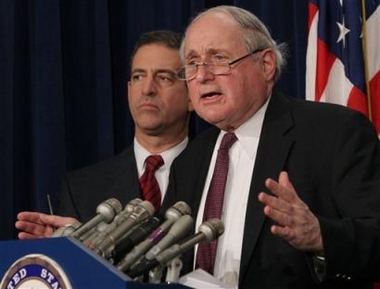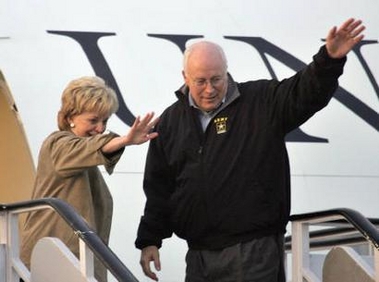|
US Cheney says president has spying authority
(AP)
Updated: 2005-12-21 08:35
US Vice President Dick Cheney on Tuesday called for "strong and robust"
presidential powers, saying executive authority was eroded during the Watergate
and Vietnam eras.
Some lawmakers objected that President Bush's decision to spy on Americans to
foil terrorists showed he was flexing more muscle than the Constitution allows.
The revelations of Bush's four-year-old order approving domestic surveillance
without court warrants has spurred a fiery debate over the balance of power
between the White House, Congress and the judiciary.
|

US Sen. Carl Levin, right, accompanied by Sen.
Russ Feingold, gestures during a Capitol Hill news conference to respond
to President Bush's earlier news conference Monday, Dec. 19, 2005 where
the president said he approved domestic spying on suspected terrorists
without court orders. 'Where does he find in the Constitution the
authority to tap the wires and the phones of American citizens without any
court oversight?' said Levin. [AP]
| "I
believe in a strong, robust executive authority and I think that the world we
live in demands it," Cheney said.
"I would argue that the actions that we've taken there are totally
appropriate and consistent with the constitutional authority of the president.
... You know, it's not an accident that we haven't been hit in four years," the
vice president said, speaking with reporters on Air Force Two en route from
Pakistan to Oman.
On Capitol Hill, senators from both parties said the role of Congress cannot
be sidelined åK½ï¿½ even in wartime.
"I think the vice president ought to reread the Constitution," said Sen.
Edward Kennedy.
Democrats said they were deeply troubled by the surveillance program, and
contended the president had no authority to approve it. "He has no legal basis
for spying on Americans without court approval," said Sen. Richard Durbin, the
No. 2 Democrat in the Senate.
Republicans said Congress must investigate whether Bush was within the law to
allow the super-secret National Security Agency to eavesdrop åK½ï¿½ without warrants
åK½ï¿½ on international calls and e-mails of Americans and others inside the United
States with suspected ties to al-Qaida.

U.S. Vice President Dick Cheney, (R) with his
wife Lynne Cheney, wave before leaving Pakistan at military base in
Rawalpindi December 20, 2005. [Reuters] | "I believe the Congress åK½ï¿½ as a coequal branch of government åK½ï¿½ must
immediately and expeditiously review the use of this practice," said Sen.
Olympia Snowe.
Snowe joined three other members of the Senate Intelligence Committee,
including Nebraska Republican Chuck Hagel, in calling for a joint inquiry by the
Senate judiciary and intelligence committees.
The administration defends the program, saying Congress gave Bush the
authority to use "signals intelligence" åK½ï¿½ wiretaps, for example åK½ï¿½ to eavesdrop
on international calls between U.S. citizens and foreigners when one of them is
a suspected al-Qaida member or supporter.
Attorney General Alberto Gonzales cites the Authorization to Use Military
Force law, which Congress passed and Bush signed a week after the Sept. 11
terrorist attacks. The administration believes that law lets the government
avoid provisions of the 1978 Foreign Intelligence Surveillance Act.
The surveillance act was passed after public outcry over abuses during the
Nixon administration, which spied on anti-war and civil rights protesters. Under
the act, known as FISA, an 11-member court oversees government applications for
secret surveillance or searches of foreigners and U.S. citizens suspected of
terrorism or espionage.
"I'm not a lawyer, but in my reading, it is pretty conclusive, very
conclusive, that FISA prohibits all warrantless electronic surveillance of
Americans in America," said Sen. Dianne Feinstein.
Sen. Joe Lieberman asked: "Why didn't the administration feel that it could
go to the FISA court to get the warrant?"
|